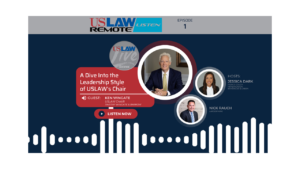USLAW NETWORK names Gerber Ciano Kelly Brady LLP of Buffalo, New York, as the newest member of… Continue Reading
Why Delaware is “Essentially Home” for Most Corporations
POSTED MAY 2, 2016
Written by Christopher H. Lee of Cooch and Taylor, P.A. in Delaware for the Spring/Summer 2016 issue of USLAW Magazine
Every attorney recalls the halcyon days of law school when we were lectured ad nauseum on the topic of personal jurisdiction. Those lessons began with Pennoyer v. Neff, an opinion concerning state sovereignty that held a court only had jurisdiction over persons within the confines of the state in which the court sat. Eventually we tracked our way through Supreme Court case after Supreme Court case until we got to the 1945 decision International Shoe Co. v. Washington, which many of us fondly refer to this day as “International Shoe.” International Shoe greatly expanded upon Pennoyer, holding that a court could exercise personal jurisdiction over an out-of-state defendant if the defendant had “certain minimum contacts with the state such that the maintenance of the suit does not offend traditional notions of fair play and substantial justice.”
Through the years, the federal courts have attempted to define what those “certain minimum contacts” are and more importantly, how “traditional notions of fair play and substantial justice” may or may not be offended. International Shoe differentiated between what we now call “specific jurisdiction,” which is where the activities giving rise to the lawsuit occurred within the forum state and “general jurisdiction,” which is where a defendant’s activities within a state are so “continuous and systematic” as to render them “essentially at home” in the state, thus allowing the state to have personal jurisdiction over claims irrespective of where the activities giving rise to the suit occurred. General jurisdiction is the much more hotly debated of the two categories of personal jurisdiction and the Supreme Court has once again provided us with guidance on this issue in two recent decisions…READ MORE.











